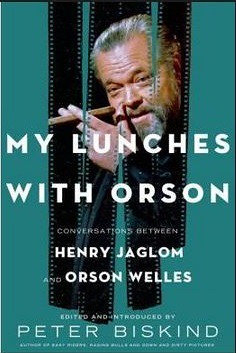Orson Welles is the man credited for the film classic Citizen Kane. He directs the film and acts in it and he directed other films as well and acted in a lot more films than he directed.
He died October 20, 1985.
Henry Jaglom is also an actor and a director. He directed Orson opposite Tuesday Weld and Jack Nicholson in 1971's A Safe Place. He's the original independent film director. He directed Dennis Hopper (1976's Tracks), Karen Black (1983's Can She Bake A Cherry Pie?), Vanessa Redgrave (1997's Deja Vu) and many more great performers and films.

Orson Welles and Henry Jaglom were friends and Orson asked Jaglom to tape their conversations which he did. He even had them transcribed and then handed them over to Peter Biskind who edited them into My Lunches With Orson: Conversations Between Henry Jaglom and Orson Welles.
The result? A lively transcript in featuring would be guest stars (Jack Lemmon, for instance, gets invited to sit down and join them while Richard Burton is sent packing).
Here's a typical excerpt.
HJ: Now, Lombard could not have been very bright.
OW: Very bright. Brighter than any director she ever worked with. She had all the ideas. Jack Barrymore told me the same thing. He said, "I've never played with an actress so intelligent in my life."
HJ: But Gable was certainly not bright.
OW: No, but terribly nice. Just a nice big hunk of man. If you're working hard that long -- if you have to be in makeup at five fifteen, and you get home at seven o'clock -- how much brightness do you want? The guys just wanted to stagger home at seven o'clock -- how much brightness do you want? The guys just wanted to stagger home -- and, if they could, get laid. Otherwise, a happy smile and get ready for the next day's work.
HJ: So Lombard was also killed in a plane crash?
OW: Yes. You know why her plane went down?
HJ: Why?
OW: It was full of big-time American physicists, shot down by the Nazis. She was one of the only civilians on the plane. The plane was filled with bullet holes.
HJ: It was shot down by who?
OW: Nazi agents in America. It's a real thriller story.
HJ: That's preposterous. What was she doing on a plane full of physicists? Do people know this?
OW: The people who know it, know it. It was greatly hushed up. The official story was that it ran into the mountain.
JH: The agent had antiaircraft guns?
OW: No. In those days, the planes couldn't get up that high. They'd just clear the mountains. The bad guys knew the exact route that the plane had to take. They were standing on a ridge, which was the toughest thing for the plane to get over. One person can shoot a plane down, and if they had five or six people there, they couldn't miss. Now, I cannot swear it's true. I've been told this by people who swear it's true, who I happen to believe. But that's the closet you can get, without having some security clearance. No one wanted to admit that we had people in the middle of America who could shoot down a plane for the Nazix. Because then everybody would start denoucning anybody with a German grandmother. Which Roosevelt was very worried about. The First World War had only happened some twenty-odd years before. They were getting lynched. And he was very anxious for nothing like that to be repeated.